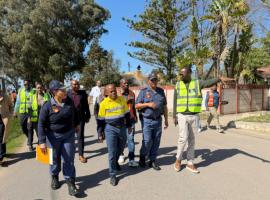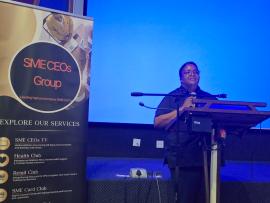Shares drop after Samsung and SK Hynix lose right to import US equipment in China
The logo of SK Hynix at and exhibition in Seoul, South Korea, in 2024. REUTERS/KIM HONG-JI/FILE
The logo of SK Hynix at and exhibition in Seoul, South Korea, in 2024. REUTERS/KIM HONG-JI/FILE


Eviction notices issued to occupants of hijacked State properties Public Works and Infrastructure Deputy Minister Sihle Zikalala has issued eviction notices to over 100 illegal occupants who have hijacked State properties in Cape Town. Two properties in Goodwood and Khayelitsha, meant for use by the South African Police Service (SAPS), have been hijacked and are illegally occupied. Zikalala issued the eviction notices while leading Operation Bring Back (OBB) in Cape Town on Sunday. Operation Bring Back is a nationwide campaign led by DPWI Deputy Minister, Sihle Zikalala, and its intended purpose is to recover all stolen State land and property. Some of these properties include those that are vacated by user departments without being brought back to the department, and have become vulnerable to illegal occupation. As a result, some are run down due to overcrowding and dilapidation and lack of management by State institutions that were allocated the buildings. During this Cape Town leg of Operation Bring Back campaign, many whistle-blowers came forward and others physically brought evidence to the Deputy Minister of stolen properties by even commercial entities and NGOs. The Goodwood property Zikalala first visited is a residential property that was donated to the asset portfolio of government by patriotic citizen, the late Clair Shelly Boulton, to be used by the South African Police Service. In her will, Boulton clearly stated that the property must be used by the SAPS for fighting drug abuse in the community. The property has since been hijacked and is believed to be used as a drug peddling den against the will of Boulton, who donated the property. Illegal occupants have invaded the property and have erected temporal structures. Currently there are 12 illegal occupants including children. There is allegedly rampant substance abuse including drugs in the property. The second property visited is the 946.90 Ha on Stellenbosch Road, near Khayelitsha, which was allocated for mixed use by SAPS, including residential accommodation, public order policing, stock theft, anti-gang and shooting range. The farm was used to accommodate SAPS officials, many of who have since left after being deployed to other areas, leaving many of the houses vacant. The farm has vast land, which has been illegally occupied and informal settlements proliferation is taking place. Zikalala’s visit has revealed a huge problem of hijacked State properties not only by the poor and people desperate for houses but by big commercial entities, NGOs and those posing as owners and collecting rent money from illegal occupiers. Failure to comply with the eviction notices, the Department of Public Works and Infrastructure said, will result in legal action. “Clearly the problem of illegally occupied, hijacked and stolen government properties is extensive and underestimated. We are seeing a strong element of poor management of State assets that are handed over to client departments that do not hand them back the department [when they vacate them],” said Zikalala. Zikalala will be intensifying Operation Bring Back in the coming months. A support programme, which includes the appointment of property specialists, has been developed to identify, audit, analyse, evict and recover illegally occupied and hijacked buildings. The focus is on all buildings that are supposed to be in the immovable asset register of the Department of Public Works and Infrastructure. In carrying out evictions of land and buildings by an unauthorised occupants, the department follows legal processes, including the Prevention of Illegal Eviction (PIE) from and Unlawful Occupation of Land Act, 19 of 1998, which regulates the eviction of unlawful occupiers from land and property in a fair manner, while recognising the right of landowners to apply to a court for an eviction order in appropriate circumstances. – SAnews.gov.za Edwin Mon, 09/01/2025 - 15:14 42 views




With drama heating up and couples pushed to their breaking points, Married at First Sight Mzansi has cemented itself as one of the most compelling reality experiments on local television.
The company says it’s contacting affected customers and advising them to get in touch with a dealer to have the necessary repairs completed free of charge.

Today’s recipe features crispy hashbrown and egg cups, combining savory flavors in a convenient, portable form.

Work on reviewing inflation targeting ongoing While government continues to review reducing inflation levels, the Ministry of Finance and the South African Reserve Bank (SARB) have asserted that the work being done on it will be evidence based. South Africa continues to target inflation within the 3‒6% range, with the SARB focusing on anchoring inflation at the midpoint of the range, or 4.5%, since 2017. “Research and consultations have however highlighted a range of specific challenges associated with a wide target band and the long-term costs to the economy and entrenched inequality caused by relatively high inflation,” a joint statement by Ministry of Finance and SARB said on Monday. With the post-pandemic surge in inflation fading, National Treasury and SARB have analysed and discussed the value of reducing inflation to levels consistent with the country’s trading partners. “Over the past year, inflation expectations have shifted downward in line with softer inflation outcomes. To sustain this progress and meet its constitutional mandate of price stability, at its July 2025 meeting, the SARB’s Monetary Policy Committee expressed its preference for consumer price inflation to remain low, around the bottom end of the current target range of 3‒6%. “Similarly, National Treasury, in its 2024 Macroeconomic Policy Review, acknowledged that low and stable inflation is good for economic growth and concluded that monetary policy goals have broadly been achieved,” the statement said. The review also emphasised that, while the current macroeconomic policy framework is fit for purpose and flexible to changing conditions, some adjustments could make it more effective. In this regard, additional technical work was undertaken by the Macroeconomic Standing Committee (MSC) of the two institutions to assess the appropriateness of the inflation target. “As has been the practice, macroeconomic policy, including adjustments to the inflation target, will continue to be evidence-based. As the technical work draws to a close, the MSC will draft recommendations on the inflation target and table them to both the Minister of Finance and the Governor of the SARB. “The Minister of Finance and Governor will agree on any changes to the target band. The Minister of Finance will make a formal announcement as soon as is practical to anchor expectations,” the statement said. Rising public debt and inflation globally have made clear the importance of sound macroeconomic frameworks to sustainable economic growth. “Since the pandemic and its aftermath, domestic inflation has eased, and the debt trajectory tempered. Monetary policy has been effective, and fiscal policy is actively moving to a more sustainable path for public finances. “Nonetheless, new risks to the global outlook underscore the high potential for further global shocks. Macroeconomic policy needs to be both flexible and robust to these shocks and the many others that will inevitably come our way,” the statement read. - SAnews.gov.za nosihle Mon, 09/01/2025 - 14:55 10 views

Women entrepreneurs urged to harness procurement opportunities Deputy Minister for Women, Youth and Persons with Disabilities, Mmapaseka Steve Letsike, has called on women entrepreneurs across sectors including ICT, agriculture, finance, education, hospitality, energy, and climate to take advantage of legal frameworks, government programmes, and the 40% public procurement target to strengthen their businesses. Speaking at the Women-Owned Business Empowerment series in Richards Bay, on Saturday, Letsike stressed that the commitments to women’s economic participation must be “tracked and enforced.” “Empowerment is not an act of goodwill; it is our collective responsibility,” she said. Letsike noted that access to finance remains one of the greatest obstacles for women entrepreneurs. “Women are less likely to have collateral, less likely to be considered “credit-worthy” by traditional banks, and more likely to face discrimination in the allocation of capital,” the Deputy Minister said. Government has introduced measures such as the R3.2 billion Women Empowerment Fund, managed by the Industrial Development Corporation (IDC), and procurement reforms that channel at least 40% of public sector procurement spend to women-owned businesses. However, Letsike acknowledged that the implementation gaps remain, and bureaucracy continue to frustrate the same entrepreneurs it seeks to support. “Our task is to ensure that policy commitments translate into real opportunities on the ground. Beyond finance, we must address access to markets. “Too often, women’s businesses are confined to the informal sector, unable to grow beyond micro-enterprise level because they cannot access supply chains,” the Deputy Minister said. The Deputy Minister highlighted the role of the Women’s Economic Assembly, which brings together government, business, and civil society to open value chains in sectors such as mining, agriculture, automotive, retail, and ICT sectors to women-owned enterprises. “These commitments must now be tracked and enforced,” Letsike said. Digital inclusion While acknowledging that the role of the Fourth Industrial Revolution (4IR) in reshaping how people live and work, Letsike said the digital divide threatens to leave women behind. “In South Africa, women are less likely to have access to smartphones, data, or digital literacy training. Yet, digital platforms are increasingly where businesses are born, where trade is conducted, and where opportunities are found, particularly with the rise of e-commerce as a disruptive force on how business is conducted. She added that programmes such as SA Connect, the Smart Africa Youth Chapter, and initiatives by the Department of Communications and Digital Technologies to expand broadband access must prioritise women, especially in rural and township areas. “When women are digitally connected, they are economically connected,” she said. Letsike also emphasised that empowerment strategies must account for the diverse realities faced by women. “Young women face higher unemployment rates than men. Women with disabilities encounter double discrimination in accessing opportunities. Rural women must contend with geographic isolation and poor infrastructure. Migrant women face legal and social barriers to inclusion. “An effective empowerment strategy cannot treat women as a monolith, it must be tailored, intersectional, and responsive to the lived realities of diverse women,” the Deputy Minister said. – SAnews.gov.za GabiK Mon, 09/01/2025 - 14:51 12 views
A worker cuts a metal plate in a industrial tank manufacturing factory. Factory activity dipped back into contraction in August as weak demand and global pressures weigh on SA's manufacturing sector. Picture: REUTERS/AMIT DAVE
Liverpool manager Arne Slot celebrates after their Premier League win against Arsenal at Anfield on Sunday.